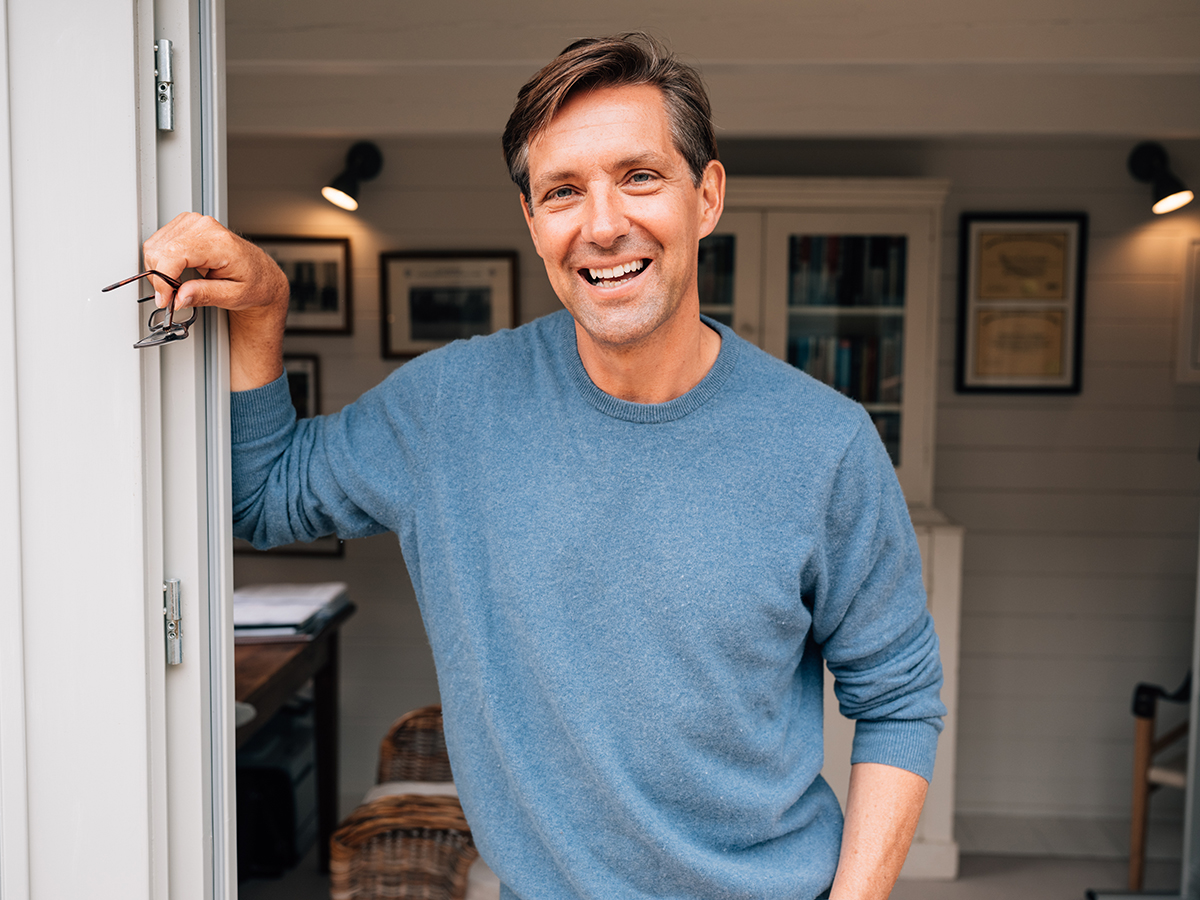
Life coach Simon Hodges with his family. Photograph by Matt Porteous
Life coach Simon Hodges has transformed the lives of royalty, entrepreneurs, billionaires and their families. In the first of his new monthly column for LUX, Simon discusses how and why problems arise in familial relationships
Wealth is a magnifying glass – under its focus, problems seem larger and the fall from grace far further. In this way, money accumulates fear – just as it brings comfort and security, it also raises the stakes and expectations for everyone in a family.
Follow LUX on Instagram: luxthemagazine
Having worked with some of the world’s wealthiest families, I have seen how this fear can become all-encompassing, insidiously eroding the foundations of a healthy family dynamic. If left too late, suppressed ill-feeling and latent passive aggression almost always lead to conflict.
So, with this in mind – and given the surprising amount of time we are having to spend with our relatives of late! – I thought I would share how and why families fall apart and (in my next column) the steps you can take to prevent this.

Simon Hodges. Photograph by Matt Porteous
Where does it all go wrong?
‘Home is where you are loved the most and act the worst’
We reluctantly know and accept that we behave our worst in our closest relationships, the question is: why?
Assumptions
Each and every one of us is a teeming mass of assumptions. We suppose, surmise, infer and predict all the time, partly out of necessity, but primarily because of our beliefs (more on this later!). Within our families, we consistently assume that we know:
- what the other person is thinking
- how someone is going to react to a specific situation
- how things should be
- what’s right and wrong
And yet, the reality is that we don’t actually know ‘The Truth’ in our relationships; how are we supposed to, if we can never really understand what the other person is feeling and thinking?
When we make assumptions, we aren’t just deceiving ourselves based on our own predispositions and beliefs, we are also limiting our ability to remain open and loving to those around us.
In this way, embedded in every assumption is a veiled judgement. This judgement stifles love and authenticity and tears families apart from within.
Read more: Activist José Soares dos Santos on environmental responsibility
Wanting to change each other
This is a big one and one of the most destructive behaviours I see come up again and again.
Although families are ostensibly a single unit, they are always made up of individuals with their own unique skillsets and viewpoints. But all too often, these differences are seen as obstructive and unwanted complications. Parents want to iron them out, grandparents see them as a threat, and children learn to smother their real identities for the sake of everyone else.
When these differences can’t be dealt with – how are you actually meant to change someone’s nature? – it becomes a constant source of shame for the parents. They believe that not bringing up a child who is identical to them in every way is a sign of some parental failure.
And so, over time, families become locked in a self-sabotaging pattern of ‘I win, you lose’ behaviour. A cycle of blame and shame takes root when those who are different feel ostracised, and those who can’t ‘sort out’ these differences feel powerless.

Photograph by Matt Porteous
Labelling family members
Think about the members of your family for a moment and come up with some labels that you have for each other. Do the following resonate?
- the black sheep
- the prodigal child
- the anxious one
- the emotional one
- the difficult one
- the prima donna
- the control freak
Just like assumptions, labels can quickly pass from opinion to fact; a passing remark can stay stuck for a lifetime and feed into a burgeoning narrative of ‘us and them’. But in reality, these ‘facts’ almost always grow out of fear. Labels, like judgements, are without fail more a reflection of our own insecurities than the person we’re labelling.
Think about the different ways you typecast and characterise your relatives and how this reflects your own beliefs and fears. Are you jealous of the black sheep’s freedom? Do you envy the attention the prima donna receives?
Read more: OceanX founders Ray & Mark Dalio on ocean awareness
We love to push each other’s buttons
In some families, the need to push each other’s buttons is relished as if it is a sport. The competitive urge to provoke a reaction and test the limits of those we know best chips away at any harmony and goodwill that might exist.
The lugging baggage and dense experience which accumulates around all families eventually explodes under this compiled pressure and the default reaction is always one of fear – fight, flight or freeze. We either challenge, flee or shut down, but no matter the response, it never brings a family closer together.
The heart of the matter
We all want to be loved, worthy and enough. Yet throughout our childhoods we pick up limiting beliefs which convince us that love and worth and abundance are conditional:
I will only be loved when I….
I will only be enough when I…
I will only be worthy when I…
These beliefs are deep-rooted and drive incredible amounts of our behaviour. They are also the primary force holding back a family from longevity and genuine connection.
Thriving as a family, as a cohesive and loving unit, can seem like an ever-developing enigma. As parents age and children have children and grandparents pass on legacies, there are always new issues arising.
Over the last decades I have seen countless families fall apart and come together again. At the heart of every success story was a personal commitment from every member to let go of judgement, to renounce the labels and destructive assumptions, and lead with love rather than fear.
Find out more about Simon Hodges’ work: simonhodges.com; @simonhodgescoaching







Recent Comments